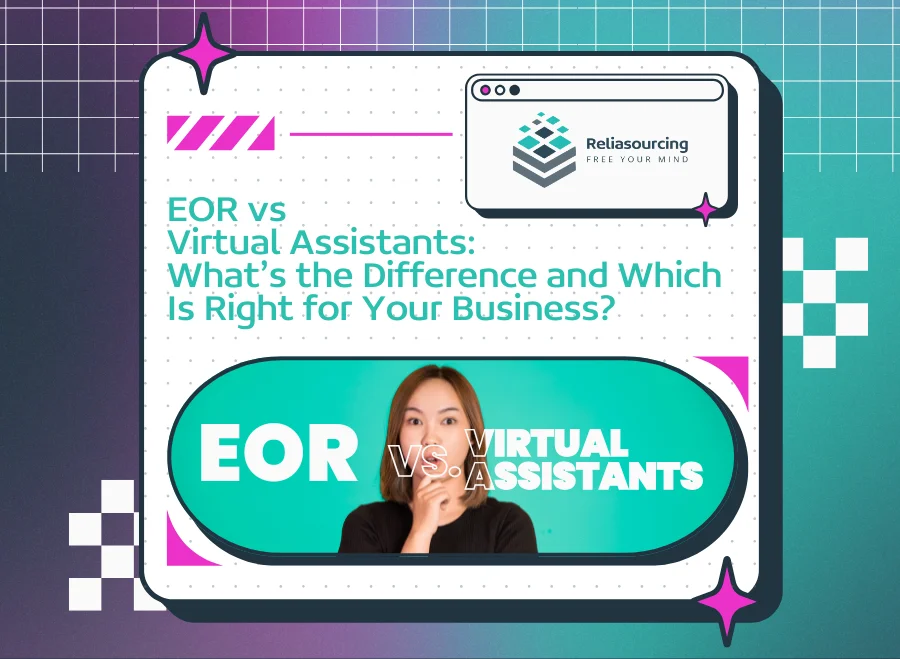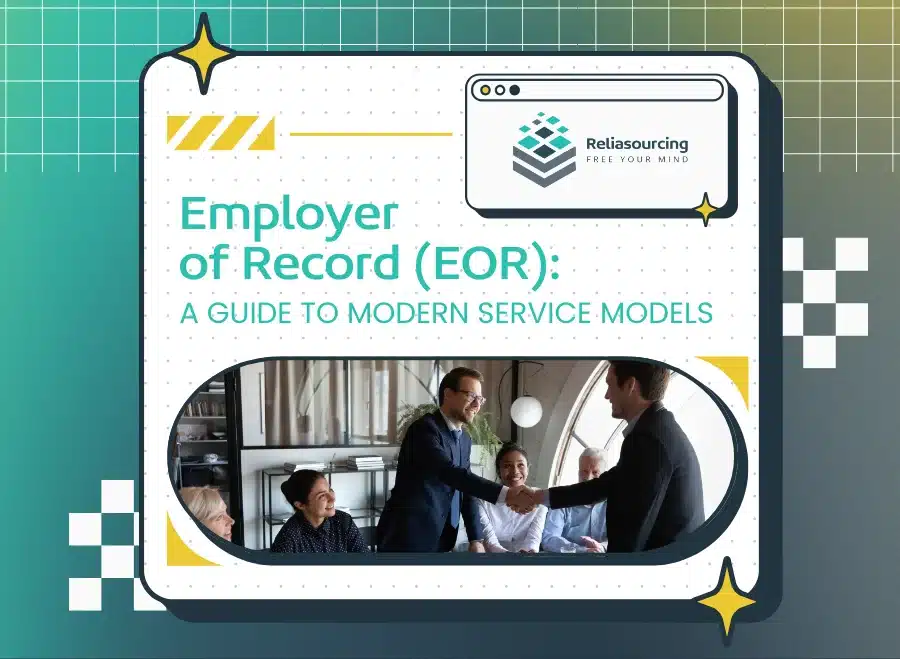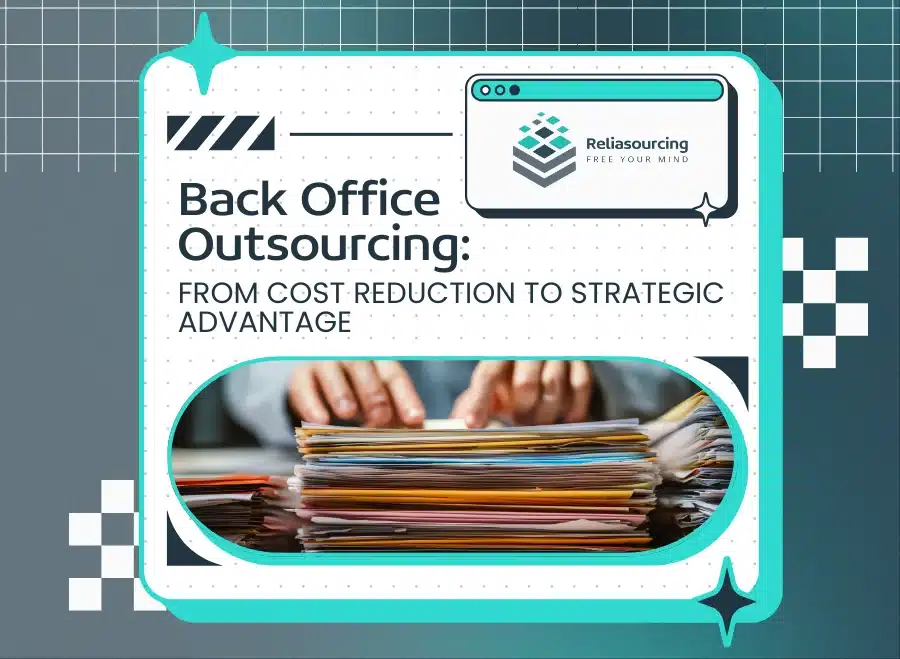Businesses looking to expand globally or optimize remote operations often weigh two popular options: hiring Virtual Assistants (VAs) or engaging an Employer of Record (EOR). Both can strengthen efficiency and help manage costs, but they serve very different functions. Startups and growing companies must consider long-term goals, legal obligations, and operational control before choosing which path to take.
This article explains how each model works and the value it brings to different stages of business growth. Learn the distinctions between an Employer of Record and a Virtual Assistant setup, how each impacts compliance and scalability, and when it makes sense to choose one over the other. Then, discover how Reliasourcing delivers EOR-backed outsourcing in the Philippines, giving businesses the structure and flexibility to expand confidently.
Defining the Two Models: EOR vs VA
An Employer of Record (EOR) acts as the legal employer for your remote or international workforce. The EOR manages HR administration, payroll, tax compliance, and local labor laws on your behalf, allowing your company to build a legitimate team in another country without having to set up a legal entity. The structure is particularly valuable in the Philippines, where foreign companies often prefer to hire full-time staff but want to avoid the complexity of establishing a local business.
In contrast, Virtual Assistants (VAs) are typically independent contractors who handle administrative or specialized tasks remotely. They may be self-employed or work through an agency, often providing support in areas such as scheduling, data entry, marketing, or customer service. While they can help streamline workflows, they operate outside your company’s HR system, meaning the client has limited control over work hours, compliance, and employment rights.
The difference lies in the employment relationship. An EOR ensures that each employee is legally hired, paid in accordance with local regulations, and entitled to proper benefits. A VA relationship is more transactional, with little to no compliance responsibility for the hiring company. With the structure of EOR, companies mitigate the risks associated with employing outsourced support, while also gaining benefits.
Scalability, Flexibility, and Control
Similar to the benefits of outsourcing, both EOR and VA arrangements offer flexibility, but they differ in their depth and intent. A Virtual Assistant model is suitable for short-term projects or businesses testing remote support for the first time. Since VAs are independent, scaling teams appears to be easy at first glance—hire more freelancers when demand rises and scale down when projects end. However, the flexibility comes with limits. High turnover, inconsistent quality, and lack of team cohesion often make scaling difficult over time.
EOR, on the other hand, supports sustainable growth. Through an EOR, businesses can hire full-time professionals who work exclusively for them, fully integrated into their operations. The EOR ensures that contracts, taxes, and benefits comply with local employment laws and regulations, providing better accountability and stability, particularly for companies planning to expand their presence in outsourcing hubs such as the Philippines.
Control is another defining factor. With a VA, clients manage outputs but not employment terms. With an EOR, companies maintain operational control while the EOR handles all statutory obligations. The hybrid arrangement creates a structured yet flexible foundation for global expansion.
| Criteria | Employer of Record (EOR) | Virtual Assistant (VA) |
| Employment Status | Full-time employee | Independent contractor |
| Legal Compliance | Managed by EOR | Client assumes risk |
| Scalability | Long-term, structured growth | Short-term, task-based |
| Cost Efficiency | Predictable and compliant | Lower upfront but variable |
| Control | High operational control | Limited to task outcomes |
| Team Integration | Dedicated staff | Individual contributors |
Frequently Asked Questions: EOR vs VA
Is an EOR more expensive than hiring Virtual Assistants?
An EOR is not necessarily more expensive than hiring Virtual Assistants. While Employer of Record services include taxes, benefits, and compliance management—making them appear higher in cost upfront—they often save money over time by avoiding legal penalties, misclassification risks, and frequent turnover. Virtual Assistants may have lower hourly rates, but the lack of structure can lead to higher long-term costs for training and quality control.
Can a VA provide the same level of accountability as an EOR employee?
A VA cannot provide the same level of accountability as an EOR employee. Employer of Record models place professionals within your operational framework, following company policies, work schedules, and performance metrics. Virtual Assistants, meanwhile, operate independently and are not bound by labor laws or corporate policies, limiting oversight and long-term consistency.
Which is better for startups? VAs or EOR?
Which is better for startups, between VAs or EOR, depends on their goals. Startups seeking short-term, task-based help often start with Virtual Assistants. However, as they grow and require full-time roles, structured management, and compliance with local employment laws, EOR services become a more stable and scalable choice. Startups expanding into the outsourcing Philippines market often find EORs ideal because they eliminate the need to register a local entity.
Are EORs only for large corporations?
EORs are not only for large corporations. Small and medium-sized businesses can also benefit from using an Employer of Record, particularly those entering new markets or hiring remote employees in countries such as the Philippines. Reliasourcing’s EOR solutions are designed for flexibility, supporting startups and SMEs that require compliant hiring without the cost or complexity of establishing a local presence.
Reliasourcing’s EOR Advantage
Reliasourcing offers a hybrid approach that blends the efficiency of outsourcing with the compliance benefits of an Employer of Record. The company supports global clients in building dedicated teams in the Philippines, managing payroll, contracts, and government filings on their behalf.
Through its Employer of Record framework, Reliasourcing handles employment documentation, ensures adherence to Philippine labor laws, and maintains fair employment standards, allowing clients to focus on core operations while maintaining confidence in legal and HR compliance.
Reliasourcing’s EOR service also aligns with the growing demand for business process outsourcing in the Philippines, where access to skilled professionals and cost-effective labor makes it a top destination for remote operations.
For global companies seeking to balance flexibility with compliance, Reliasourcing provides an advantage that independent contractors cannot. With customized EOR solutions designed for startups, SaaS, and eCommerce industries, clients gain a local partner who ensures every hire is legally sound, every payroll is on time, and every employment relationship remains transparent.
How Reliasourcing Delivers Employer of Record Services
Choosing between an EOR and a VA ultimately depends on company goals. Businesses seeking quick, flexible assistance for repetitive or specialized tasks can rely on VAs. However, those planning to establish a sustainable remote presence in the Philippines or other offshore markets benefit more from an EOR partnership.
Reliasourcing’s EOR model provides long-term peace of mind by covering compliance, payroll, benefits administration, and onboarding. Clients gain access to a qualified workforce managed in accordance with Philippine labor standards, while maintaining complete control over operations. EOR is a structure that ensures consistency and accountability that freelance-based setups can rarely match.
Companies that partner with Reliasourcing benefit from the assurance of a fully compliant structure, eliminating the need to establish a local entity. The model supports industries such as eCommerce, SaaS, and professional services, all of which require reliable teams to manage global operations efficiently.
For those exploring sustainable outsourcing options, the key takeaway is clear: a Virtual Assistant offers flexibility for short-term needs, while an EOR provides a pathway for structured, scalable growth. Businesses that choose Reliasourcing as their partner gain the best of both worlds: outsourcing flexibility backed by a solid legal infrastructure.
EOR and VA solutions both serve meaningful roles in business operations. The best choice depends on growth objectives, compliance priorities, and the desired level of control. For organizations planning to expand in the Philippines or build remote teams with legal assurance, an Employer of Record model provides a stronger foundation for success.
To learn more about how Reliasourcing can support your global hiring needs, contact our team today and explore Reliasourcing as a trusted EOR partner in the Philippines for global expansion.









